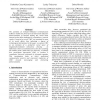Free Online Productivity Tools
i2Speak
i2Symbol
i2OCR
iTex2Img
iWeb2Print
iWeb2Shot
i2Type
iPdf2Split
iPdf2Merge
i2Bopomofo
i2Arabic
i2Style
i2Image
i2PDF
iLatex2Rtf
Sci2ools
106
click to vote
HICSS
2000
IEEE
2000
IEEE
CMC and the Question of Democratisation: A University Field Study
The potential of Computer-Mediated Communication (CMC) to enable new forms of social interaction and foster democratisation of decision making has raised much interest but has been challenged by contradictory research results. Conceived as a tool, CMC was examined in terms of its social effects thus indicating a degree of technological determinism. In this paper, we explore CMC as an extension of a productive social space of linguistically-mediated interaction, drawing on Habermas’s theory of communicative action. By examining the evidence from a field study of a university, we identify how participants appropriate CMC to produce a consultative discourse motivated by divergent agendas. This investigation helps us better understand communicative practice and concurrent tendencies of CMC towards encouraging and obstructing democratisation.
Biometrics | Foster Democratisation | HICSS 2000 | Participants Appropriate Cmc | Productive Social Space |
Related Content
| Added | 31 Jul 2010 |
| Updated | 31 Jul 2010 |
| Type | Conference |
| Year | 2000 |
| Where | HICSS |
| Authors | Dubravka Cecez-Kecmanovic, Lesley Treleaven, Debra Moodie |
Comments (0)

